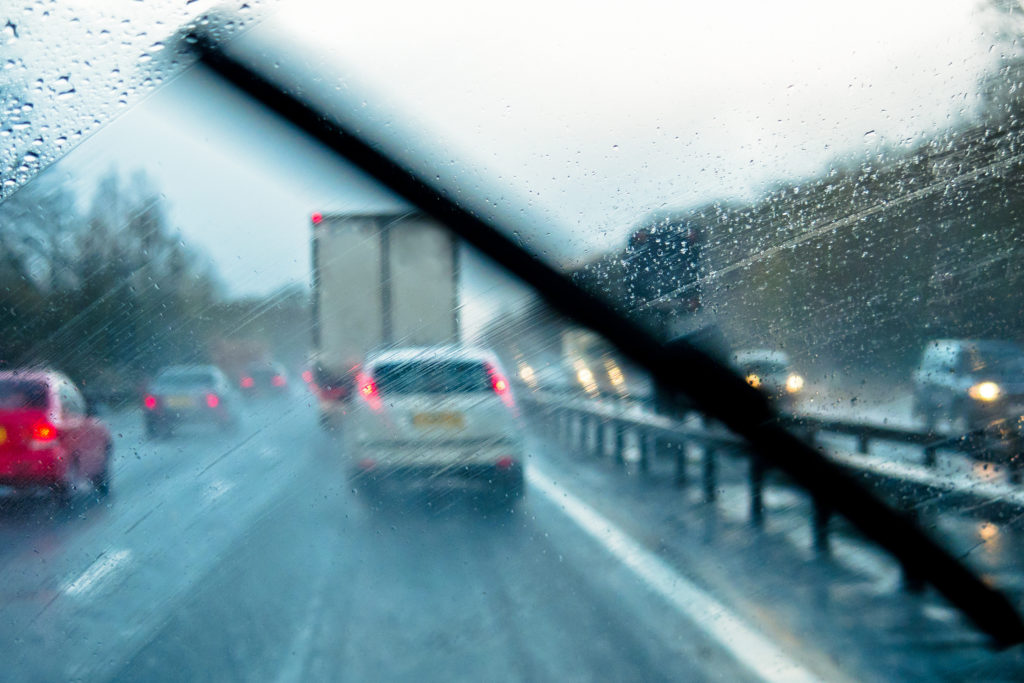
As Hurricane Dorian begins to make its way into the southeast coast–after causing significant damage to homes and infrastructure in the Bahamas last Tuesday–The Federal Motor Carrier Safety Administration has issued an emergency declaration for the states laying in the rest of the hurricane’s path.
The FMCSA is offering regulatory waivers to motor carriers participating in relief efforts in states and territories such as Alabama, Florida, Mississippi, Tennessee and Puerto Rico. Dorian has reached a maximum sustained windspeed of 110 miles per hour, hitting the North Carolina coast Friday morning along with heavy rain.
Although the hurricane’s effects are not forecast to hit us here in Illinois, it may be possible we’ll get heavier wind and rain than is usual for this time of year. Not to mention, we all know we see our fair share of inclement and stormy weather, especially as we head into the fall and winter seasons.
Because of this, Online Drivers Ed has some helpful tips on how to stay safely driving on the roads should weather such as this occur–because “any type of severe weather can significantly increase a driver’s risk of an accident.” As you try to avoid a storm, so do all other drivers on the road, so extra caution is vital in all regards.
Strong winds can push vehicles off the road while blowing debris, trees, or even power lines in their way. Heavy rains can also make roads excessively slippery and reduce visibility.
So, how do you stay on the road safely if you do have to drive?
Driving in stormy weather:
Thunderstorms and severe weather can make for a very turbulent ride. If you must be on the road, follow these guidelines.
-Get rid of distractions–Don’t talk on the phone, text, or play music. You need to give driving conditions your full attention; however, it may be helpful to listen to storm updates via radio.
-Stay home–Try and wait for as much of the bad weather to clear as possible before leaving the house.
-Pull over–Consider pulling over if you can’t see more than a few yards ahead of you, if there is hail, or if you feel unsafe.
Driving in heavy winds:
Although you may not realize you should take precautions in windy weather, winds can cause injuries and accidents, especially in wide open spaces–like stretches of highway, on overpasses, and in tunnels.
-Anticipate wind gusts–Be cautious when driving somewhere prone to stronger winds, or when strong winds are forecast.
-Look out for larger vehicles–Tractor-trailers and recreational vehicles are particularly susceptible to heavy winds, so stay aware of those having trouble keeping in their lanes.
-Keep wheel firmly in your grasp–Wind can cause your vehicle to veer right or left, but you can maintain better control by keeping both hands on the wheel to steer. Be extra cautious if you’re driving a truck or large vehicle.
Driving in heavy rain:
Heavy rain reduces visibility for drivers, and gives cars and trucks an increased risk for hydroplaning–which can cause fatal accidents. Steering and braking can be especially difficult in these conditions, and cause you to lose control of your vehicle.
-Take your time–Slowing down may help you prevent hydroplaning.
-Avoid driving at beginning of rainfall–Oils from cars and trucks cause slick conditions right when rain starts.
-Turn headlights on–This will help other vehicles see you, and is even the law in many states during any kind of rainfall.
-Give other cars more space–Add a few extra seconds of following time to give yourself more time to react if needed.
Additionally, The National Safety Council suggests you perform routine maintenance ahead of time, before bad weather shows up:
-Tires expand in summer heat and then deflate when air cools. Make sure all tires are inflated properly, regularly rotated and have enough tread to work safely in suboptimal road conditions.
-Make sure windshield wiper fluid reservoirs are filled.
-Check air, fuel, cabin, and PCV filters more often when conditions are dusty or air quality is low.
-Have battery life checked by a professional.
-Ensure lights are clean and bulbs are replaced once burnt out.
-Examine exhaust system for leaks and floorboards for small holes.
It’s important to take time to understand how bad weather affects driving skills. Check forecasts before you hit the road, make sure your car is maintained and can operate properly, stay cautious and alert in any kind of inclement weather, and keep off the road in these conditions when possible.
Reader Interactions